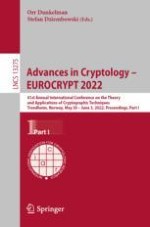2022 | OriginalPaper | Buchkapitel
Practical Non-interactive Publicly Verifiable Secret Sharing with Thousands of Parties
verfasst von : Craig Gentry, Shai Halevi, Vadim Lyubashevsky
Erschienen in: Advances in Cryptology – EUROCRYPT 2022
Aktivieren Sie unsere intelligente Suche, um passende Fachinhalte oder Patente zu finden.
Wählen Sie Textabschnitte aus um mit Künstlicher Intelligenz passenden Patente zu finden. powered by
Markieren Sie Textabschnitte, um KI-gestützt weitere passende Inhalte zu finden. powered by
